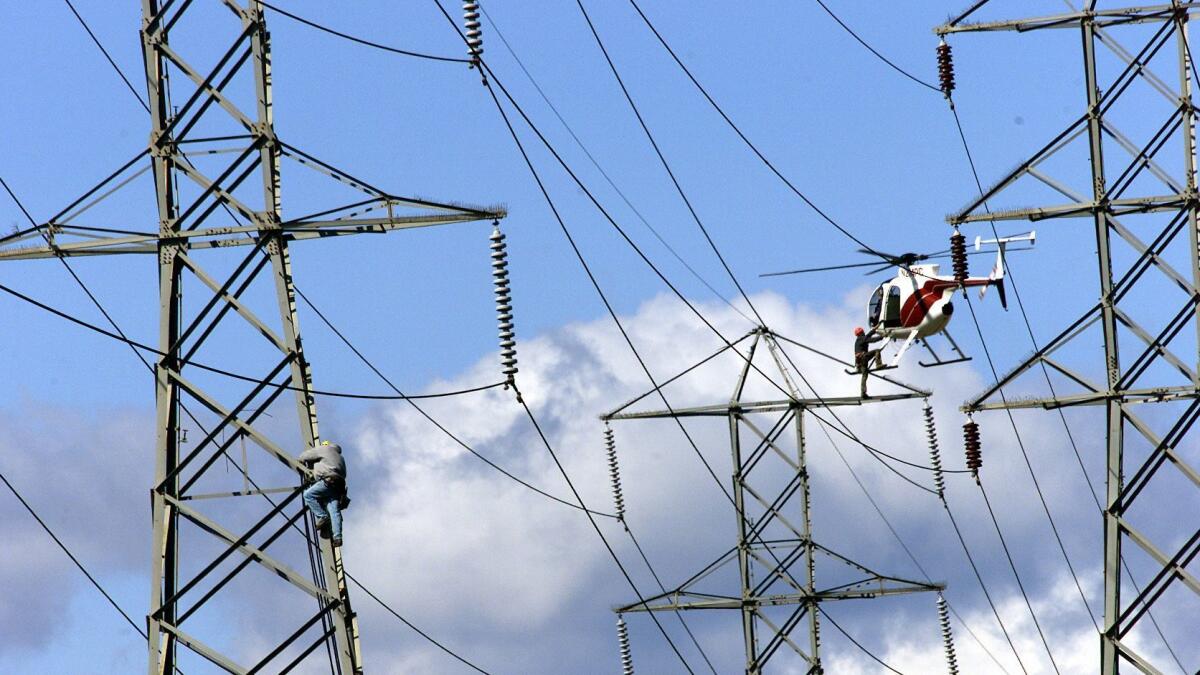Lawmakers move to add other states to oversight of California’s electric grid

Reporting from Sacramento — Under the banner of clean energy growth, lawmakers are working to change oversight of the state’s power grid to include other Western states — a move critics say will surrender California’s control over its own electricity system.
On Monday, lawmakers began reviewing a series of amendments introduced late Friday by Assemblyman Chris Holden (D-Pasadena) to alter the structure of the governing body that oversees the California Independent System Operator, the organization that runs the electric grid for much of the state.
The goal, proponents say, is to save as much as $1.5 billion a year and run the system more efficiently.
California operates with a glut of power plants and is at times forced to pay other states to take its excess solar and wind power, according to Los Angeles Times investigations.
“This is going to be good for the ratepayers of California,” Holden said of the amendments, which revive a concept long pushed by Gov. Jerry Brown.
Holden’s proposal comes just days before the legislative session concludes Friday. That outraged critics who say such a dramatic change to control of the electricity transmission system for the world’s sixth-largest economy shouldn’t happen without thorough public vetting in scheduled hearings.
Critics also contend that the assumptions suggesting substantial savings from a regional operation are faulty and that California ratepayers will only see their already-high costs increase.
The legislation “would permanently eliminate state authority over the governance of the California Independent System Operator ... based on determinations made by an ad hoc commission, a result that is unacceptable as a matter of law, policy and process,” Mark Toney, executive director of the Utility Reform Network, which represents consumers before state regulators, said in a letter to lawmakers.
The Sierra Club has long been critical of the regionalization concept, and spokeswoman Marta Stoepker on Monday called the plan “very backward.”
“At this moment in time, why would we reduce our authority over our own grid?” Stoepker said.
Sen. Ben Hueso (D-San Diego), chairman of the Senate Energy, Utilities and Communications Committee, declined to comment about the legislation.
Brown spokesman Evan Westrup said the regionalization proposal is “the product of years of discussion and input from all parties” and “creates a process to work through issues related to the governing board of a regional grid.”
Debate has raged for years over the role of the California Independent System Operator — whether it should be a regional entity that manages the electricity grid throughout the West or a California-centric operation. Cal-ISO operates the long-distance power transmission lines for about three-quarters of California’s power customers, while municipal utilities such as the Los Angeles Department of Water and Power run the rest.
Cal-ISO spokeswoman Anne Gonzales said regionalizing the grid operator would improve management of all electricity resources in California and other Western states. Although the states already are connected and share electricity, a combined electricity grid operator would enable better coordination among the states, she said.
Current system savings “are a fraction of the projected electricity cost reductions and environmental benefits the state would realize if it was part of a fully integrated, coordinated day-ahead grid and market,” Gonzales said.
“For instance,” she said, “California could sell its excess solar generation in the middle of the day to other entities, and buy Wyoming wind in the evening when our solar drops off, all in a day-ahead market that allows operators to see the next day’s demand and supply.”
The Cal-ISO expansion effort has the backing of billionaire investor Warren Buffett, whose vision includes building more wind power facilities in places such as Wyoming to help meet electricity needs in Los Angeles.
But PacifiCorp, a coal-heavy utility that is owned by Buffett’s Berkshire Hathaway and operates in Northern California as well as neighboring states, has drawn the ire of critics of the expansion effort. For its part, PacifiCorp says it is focused on increasing use of clean energy to complement California’s clean energy goals, which are mandated to reach 50% by 2030 and could go to 100% by 2045.
“Our trajectory continues to be toward more renewables,” said Bob Gravely, a PacifiCorp spokesman. “A regional market helps facilitate that transition.”
Gravely acknowledged that combining various states for a governing body the way others do in the Midwest and the East might prove challenging but something that would be worked out in detail next year.
PacifiCorp and its parent company have been making the case for the regional organization to regulators in various Western states.
Berkshire Hathaway Energy has increasingly become a dominant player throughout the western United States, acquiring utilities, building power plants and transmission networks and operating natural gas pipelines in California, Nevada, Utah, Idaho, Wyoming, Washington and Oregon.
By tying other Western states into California’s electricity grid operator, Berkshire Hathaway Energy would further increase its influence in the state and throughout the West.
Allison Clements and her Salt Lake City firm Goodgrid work with clean energy companies. She previously worked on federal regulatory issues at the Natural Resources Defense Council, which has been a strong proponent of the expanded grid operator.
She said she believes California won’t be at greater risk of federal meddling if it moves toward a regional grid.
“There’s a lot of fear about this change. Change is scary.” But, she added, “the fear is overstated.”
Former California Public Utilities Commission President Loretta Lynch and others have likened the proposed changes to Cal-ISO to an Enron 2.0 — named for the company that was at the center of the manipulation of California’s electricity markets that led to the energy crisis of 2000-01.
With the potential reduction or loss of state oversight of the electric grid and the electric sales market, consumers once again could find themselves the victims of an out-of-control energy market, they argue, noting that this is all just about Cal-ISO’s expansion, not the grid itself.
“We’ve had a totally integrated West Coast system since the 1960s,” said Robert McCullough, an energy economist in Portland, Ore. But “Cal-ISO was created to run in California.”
One objection to Cal-ISO expansion, McCullough said, is that the organization can’t handle some complex calculations such as the effect of the Pacific Northwest’s large hydroelectric plants on the broader electric grid and electricity sales market. (Gonzales at Cal-ISO acknowledged that the organization does not know how Northwest hydro would affect the market, although large hydro in the West in general was included in the modeling.)
“Their model is not sophisticated enough to work with the rest of the West Coast,” McCullough said.
Holden said that if the amendments pass and are signed into law, state officials, utilities and others will work out the details. “There’s an opportunity to advance the conversation,” he said.
Some argue that not much will change in how California’s electric grid will operate. But Lynch, now a San Francisco lawyer, said recent U.S. Supreme Court and Federal Energy Regulatory Commission rulings have made clear that regional transmission organizations fall under federal jurisdiction.
“They know what’s going to happen,” Lynch said of the proponents of the change. “They just keep saying, ‘Trust us. We have all this worked out.’”
Penn reported from Los Angeles and Megerian from Sacramento.
Twitter: @ivanlpenn @ChrisMegerian
More to Read
Inside the business of entertainment
The Wide Shot brings you news, analysis and insights on everything from streaming wars to production — and what it all means for the future.
You may occasionally receive promotional content from the Los Angeles Times.












